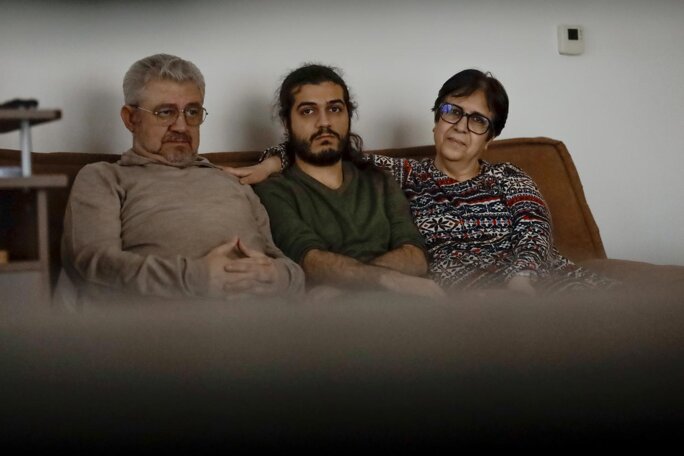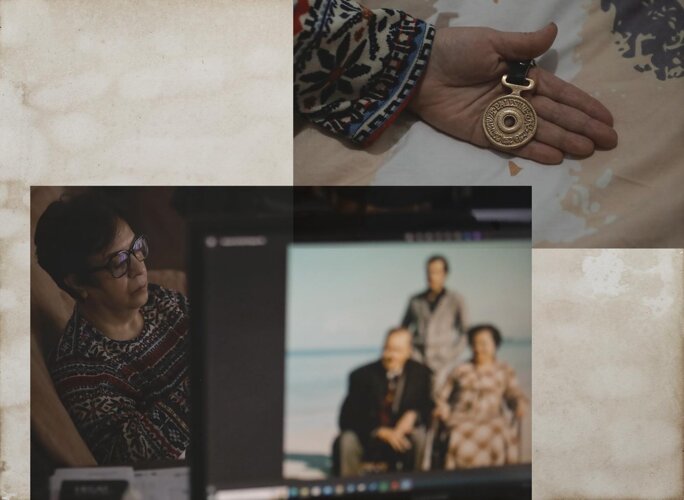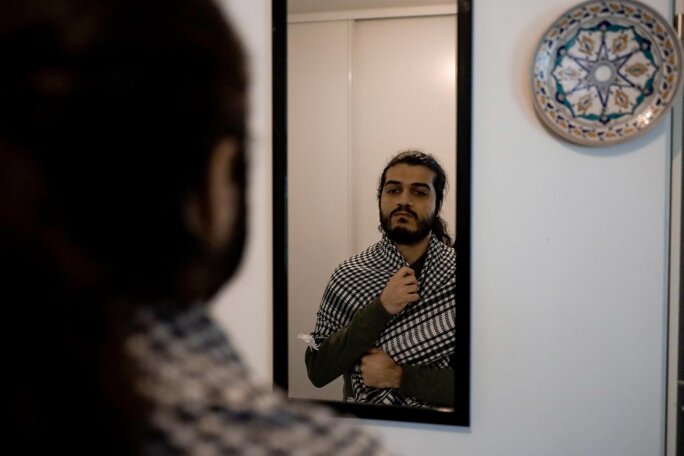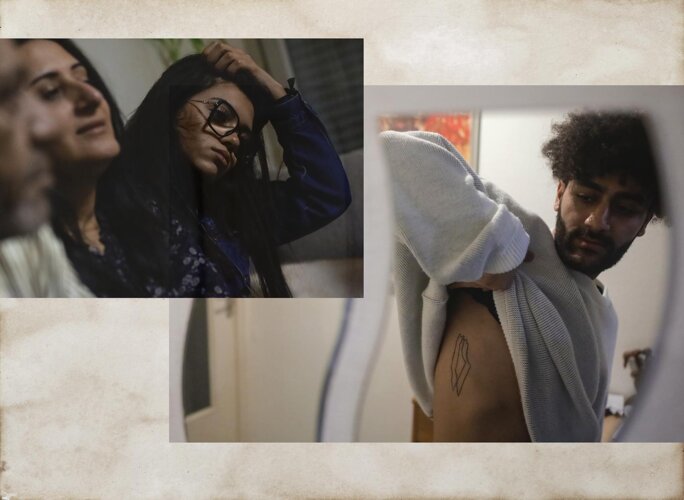Meeting with Mediapart in his family apartment in Toulouse, south-west France, 56-year-old Khalil Abu Salma, who was born in Syria, recalled how his mother would remind him that “we’re in exile, it’s not our land”. She would describe to him the lake near Safed, a town in Israel’s Upper Galilee region, previously north-east Palestine, where, in the 1940s, she used to go swimming, and where anglers went fishing. When she spoke of such memories, it was, said Salma, a former teacher of Arab literature who now runs a restaurant in Toulouse, “as if she was still there”.
“My mother had absolute faith in the idea that we would return to Safed,” he said. “Growing up, the idea grew with us.” As he spoke, cigarette in hand, his wife Maysoun, 42, and their son Adam, 20, and daughter Salma, 18, listened attentively. They are an uprooted family which, to all evidence, never feels, in truth, at home.
Like Khalil, his wife and children were all born in Syria, where they were refugees, like were his parents before them. They fled their homeland in 1948 during what in Arabic is called the “Nakba”, meaning “catastrophe”. That was when around 700,000 Palestinians were expelled or fled from their homes during the so-called Palestine War, which saw the creation of the state of Israel in a large part of what had been British-ruled Mandatory Palestine.
The forcibly displaced Palestinians became refugees notably in Syria, Jordan and Lebanon, and what became the Gaza Strip and the West Bank. Around the world but mostly in the Middle East, there are some 5.9 million Palestinian refugees registered with the United Nations.
In 2014, more than six decades after his parents fled to Syria, Khalil and his family in turn fled war-torn Syria, where they had lived all their lives without ever being entitled to adopt Syrian nationality.

Enlargement : Illustration 1

Living close to Paris is a family whose experiences are strikingly similar to those of the Salma family in Toulouse. Also of Palestinian origin, Rufeida, her husband Abdulmajeed, their son Omar and daughter Rama, arrived finally in France after they were also forced to flee Syria’s civil war. Both families agreed to recount to Mediapart the story of their long paths to exile in France.
An odysee that began in Haifa
When Mediapart interviewed the Salma family in February in Toulouse, Maysoun decided to call her grandmother Fatima via WhatsApp to better answer some of the questions about the family history. Fatima, 79, whose words are translated here, is exiled in Lebanon. She recalled how her family fled Haifa in 1948, when she was aged four, amid circulating stories of massacres, and “adults who were constantly fearful for their children”.
She and her family had until then been living in what was called Mandatory Palestine, under British rule. In November 1947, the United Nations (UN) adopted what was called the “Partition Plan for Palestine” which was to come into effect upon the imminent British withdrawal from the territory. This would have given the Arab and Jewish populations their own independent states, but the move triggered widespread violence, which led to massacres, the destruction of Palestinian villages and mass expulsions.
On May 14th 1948, the day when the British finally withdrew from the region, the creation of the state of Israel was declared. That prompted the Arab League to send forces into the territories formerly under British control, in what became known as the 1948 Arab-Israeli war. The conflict ended in a peace agreement that left Israel in control of a large part of the former Mandatory Palestine, with Jordan occupying what became the West Bank and Egypt in control of the Gaza Strip.
Thirteen children born in a refugee camp in Syria
When Fatima, along with her mother and brothers and sisters, fled the family home in Haifa in 1948, they kept the keys and she had just one set of clean clothes to change into because, Fatima explained, they believed they would be able to return “ten days later”. Fatima, whose voice rang out on the amplifier of Maysoun’s mobile phone, recalled how they began their journey on foot before mounting a cart pulled by donkeys which took them into Jordan. There they found shelter in a wheat processing factory, where they were to wait until Fatima’s father came to fetch them by car, and from there they travelled to Syria.
Finding refuge close to Damascus, the family lived with the daily hope that their situation was a temporary one. “It was provisional, it always was,” said Fatima, who remains marked by her parents’ eventual resignation that if they could not return, the children eventually would. But in reality, Fatima would never be able to do so, despite the adoption by the UN in December 1948 of a resolution 194 which enshrined the rights of Palestinian refugees to return to their homes. The resolution was never applied in practice, and has been repeatedly reaffirmed by the UN General Assembly since .
Meanwhile, Fatima and her family were eventually led to the Yarmouk refugee camp, a 2.1 square-kilometer triangle of land in the suburbs of Damascus which would eventually house an exiled population of tens of thousands. They arrived there shortly after its creation in 1957 by the UN Relief and Works Agency for Palestine Refugees in the Near East, better known UNRWA. “We were given parcels of land according to the numbers of people in a household,” she said. Fatima recalled the environment of gravel and sand, and how the main road to and from the camp was far from their home. “I built my life at Yarmouk, I had my 13 children there,” she said. “It was difficult but we were happy to have a place to live.”

Enlargement : Illustration 2

In 2012, as the Syrian civil war escalated following the brutal repression of peaceful protests against the rule of Syrian dictator Bashar al-Assad, part of the so-called Arab Spring uprisings, Fatima was once again forced to move on, fleeing with one of her sons to Lebanon. “It was a second migration, an ill-being and heart-rending,” she said.
Fatima’s great-grandchildren, Adam and Salma, were listening to her in the family living room in Toulous, hearing her account for the first time since reaching an age when they could understand it; Khalil’s daughter Salma was aged eight – and his son Adam was aged ten – when the family fled Syria, and the transmission of the family history was interrupted by the uprooting.
“We in fact little knew our great-grandmother,” said Salma. “It’s interesting because I have never been able to talk about all that with her.” The bubbly and smiling 18-year-old, nearing the end of her school studies, hopes to train as a psychologist. Her mother Maysoun, who runs a hairdressing salon in Toulouse, speaking with emotion, said that in hearing Fatima recount the traumas of exile, some of the details she had forgotten had come back to mind, and that, “When she spoke, I realised that I have lived and felt similar things when I left Syria”.
The story of Khalil Abu Salma’s family has a lot in common with that of Abdulmajeed, Rufeida and their son Omar (family last name withheld), another family of Palestinian origin now living in the Paris region. In 2013, they also fled the civil war in Syria. Above a mirror in their apartment hangs a golden coin engraved with the word “Palestine”. Rufeida bought it at the shop of an association in the Yarmouk camp, and it is a rare remaining object from their lives in Syria.

Enlargement : Illustration 3

“We are all born as refugees,” commented Omar, 28, who currently studies English and Arabic at the university of Nanterre, in the western suburbs of Paris. He also plays in a band, creating songs that mix rock with Syrian and Palestinian music styles – like those his grandmother used to hum to him in his childhood.
Omar still remembers his conversations with his maternal grandfather, who he accompanied during his final days, suffering from Alzheimer’s disease, in Syria. “On a daily basis he was sad, constantly thinking that he could return to Palestine,” Omar recalled, his face morose. “Then, during the last days of his life, with his illness he thought he was in Safed, at home, mistaking me for a friend from those times.” Rufeida, a film editor, added: “One day, when it was hot in Damascus, he even put on a coat against the cold, imagining himself in Safed.”
Safed, once a town with roughly equal numbers of Jewish and Arab inhabitants, situated in the north-east of the Galilee region, sits at almost 1,000 metres above sea level. There, Rufeida’s grandmother was a school headteacher, and her grandfather sold dairy products. She said they told her how a Zionist militia “sabotaged agricultural harvests, threatened people and set up a curfew”.
Rufeida well remembers the date of May 16th 1948, as told to her by her grandparents, which was when her family, along with numerous other inhabitants of Safed, left the town, weeks after the massacre, on April 9th 1948, of more than 100 Palestinian men, women and children in the village of Deir Yassin, close to Jerusalem.
Out of the 700 inhabitants of Deir Yassin, between 110 and 254 – according to different accounts – were killed by the Irgun far-right Zionist militia, and others. “My family said to themselves that maybe the massacres were going to come to their own town,” said Rufeida. After several days of walking they reached Lebanon, and subsequently Syria. There, they lived in a home lent to them by an association, before moving in with a family relative.

Enlargement : Illustration 4

The family of Rufeida’s husband, Abdulmajeed, a 63-year-old scriptwriter, were orange producers in Jaffa, a former port town which is today a district of Tel Aviv. He said his father saw his own father die after being shot in the arm in April 1948 by what he said was a Zionist militia “which came to spread terror”. Abdulmajeed said he wanted to write the story of his family, their forced exile to Syria, where cousins had already set up home, but he has not yet started the project: “I think about it all the time. My parents, my uncles and aunts told me everything so that I could write it.” As he spoke, he scrolled through old photos on his computer.
In 1966, when he was six years old, Abdulmajeed travelled with his parents to Ramallah and Jerusalem. They were unable to return to their home, he said. “One hour by road separated us from it, but it wasn’t possible to go there with the Israeli forces so close,” he recounted. “That visit made its mark on me, and made me understand that I came from there.”
Rufeida and Abdulmajeed never lived in the Yarmouk refugee camp, but it was there that they first met, on March 30th 1983, during a demonstration to mark Land Day, which commemorates those Palestinians and Israeli Arabs who were killed and wounded by Israeli forces in 1976 during marches in protest at planned land expropriations.
The pair built their lives together in Damascus, where, almost three decades later, they took part in the “Arab Spring” protests against the regime of Bashir al-Assad, and which were brutally repressed, sparking the civil war. Just a few days before his birthday, Omar told his mother that he didn’t want to die before he was 17. Rufeida and Abdulmajeed sent Omar and his elder sister Rama, who now lives in Spain, to Lebanon.
The parents stayed on in Damascus, where electricity and basic provisions were in short supply. One day in May 2013, recalled Rufeida, “we were warned that in one hour our neighbourhood would be bombed”. She remembers leaving clothes in the washing machine, wrongly believing she would be able to return. “I was in shock at repeating the same story as that of my family,” she said. After three years in Lebanon, the family moved to France.

Enlargement : Illustration 5

In Toulouse, Maysoun and Khalil Abu Salma told of how they too met in the Yarmouk refugee camp, where they grew up. After their marriage, Maysoun moved to Khalil’s home, a ground-floor apartment in a three-storey building adjoining another in which family members lived. Daughter Salma remembers running up to the third floor to get to the passage way that led to the other building, where she would have breakfast with her grandmother.
Yarmouk, a “temporary Palestine” turned into a pile of ruins
In Toulouse, Maysoun and Khalil Abu Salma told of how they too met in the Yarmouk refugee camp, where they grew up. After their marriage, Maysoun moved to Khalil’s home, a ground-floor apartment in a three-storey building adjoining another in which family members lived. Daughter Salma remembers running up to the third floor to get to the passage way that led to the other building, where she would have breakfast with her grandmother.
“In Yarmouk, the more you have children the more storeys you get,” said Khalil, explaining that the two square kilometres of land that Yarmouk stood on had become totally filled with buildings. Once an empty stretch of land, the population of the camp-cum-neighbourhood reached 160,000 by 2011. Khalil recalled what he called the “dynamism” of the inhabitants.
“In Yarmouk, one felt a bit as if one was in Palestine,” said Khalil’s 20-year-old son Adam, a languages student at Toulouse university. “Each road was named after a village. Yarmouk was our little temporary Palestine, for up until we return to the Palestine of our dreams.”
Adam, who last June had the outline of Palestine tattooed on his ribcage (“beside his heart”, commented his mother), remembers street games in Yarmouk, and climbing trees in the neighbourhood, but that was before 2012 and the Syrian civil war, which is what he above all has memories of.
Maysoun and Khalil took part at Yarmouk in demonstrations against the Assad regime. The forces loyal to the dictator, who had presented himself as a defender of Palestinian rights, lay siege to and bombed the camp following the unrest that began in 2012, causing the deaths, notably from starvation, of around 200 inhabitants of Yarmouk, including children.
But the couple feared not only the Assad regime, but also the threat from the so-called Islamic State group (in 2015, after the family had left, Islamic State fighters won control of most of Yarmouk, before the Assad regime took back the ruins in 2018). There was also the constant threat of snipers targeting those trying to leave the neighbourhood. “We told ourselves that we were going to die, either from hunger, because at one point we had only water and salt, or if we tried to escape,” said Maysoun.
However, in 2014 Maysoun was able to get out of Yarmouk with her two children, pretending they had school exams to take, and set up home within Damascus. Khalil joined them six months later, and very soon after they left Syria altogether because of possible reprisals over their opposition to the regime.

Enlargement : Illustration 6

They first travelled to Turkey where they spent one year before heading on to France, where they were provided with lodgings in the south-west town of Albi, later moving to Toulouse, about 80 kilometres away. “At first it was complicated to integrate,” said the couple’s daughter Salma, “then afterwards you say to yourself that you have no choice, you’re obliged to adapt.”
Adam, who now lives on his own (he has a dog which resembles a white wolf, called Simba), spoke of the difficulty in fully grasping the family’s history, complicated by the multiple exiles. “We never knew Palestine, we were born in a different country, we live in another, and in every situation we’re treated as foreigners,” he said. “But if we have children, we’ll have a lot to tell them.”
“Palestine, it’s as if it lives within us,” he added. “It will not die as long as we don’t forget it.”
Maysoun and her daughter Salma obtained French nationality in 2023, while the applications of Adam and his father are still being processed. The two women then took the opportunity last summer to travel to Israel to visit Haifa, where their ancestors once lived. “It gave me such a good feeling,” said Salma. “I was at last in the country I have always been told about. They were two incredible weeks.”
Maysoun was similarly moved by the trip. “I sometimes ask myself if I was dreaming,” she said. “I took the same paths, the same roads as my grandparents. My aunt showed me where they practiced their profession of fishers in Haifa.” On the sideboard in their living room in Toulouse sit some of the souvenirs they brought back: multi-coloured salad bowls and seashells from a Haifa beach.
It’s hard not being able to do anything, to watch Gaza emptying and that the Palestinians’ dream of returning is being annihilated.”
Both families, in Toulouse and in Paris, have been shocked and affected by the events in Gaza, and have joined pro-Palestinian marches in their respective cities. Since the Hamas attack against Israel on October 7th last year, killing about 1,200 people, and taking 253 into Gaza as hostages, Israel’s military response has, according to the Hamas-run health ministry's data, which the World Health Organization regards as credible, left 32,300 Palestinians dead, and more than 74,600 others wounded and injured.
Speaking at the family home near Paris, Omar says the events have left him “in a torpor, almost as if I no longer feel anything, except powerlessness”. While he has joined marches he says “that doesn’t help people on the ground who are being hit by bombs, and it doesn’t produce a ceasefire”.
“As long as there are children who will be bombed and who will die, I will not discuss who is right and who is wrong,” he added.
His mother, Rufeida, is sometimes glued to the television watching coverage of the events. “It’s very difficult, as a family, to put up with,” she said. “We’re in safety now, but we have lived through war and we know the feeling of being bombed. It’s terrifying.”
Her husband Abdulmajeed says he feels they are living through a new “Nakba”. He spoke of his deep “sickness” at what is happening in Gaza. “It’s hard not being able to do anything, to watch Gaza emptying and that the Palestinians’ dream of returning is being annihilated.”
“The Palestinians will not abandon resilience, and will continue to fight for their rights,” he said, adding that his hope was for “justice and peace”.
Rufeida has not abandoned the idea of a return, “even”, as she put it, if that meant sharing land, “as long as there is democracy and equal rights for the Palestinians as much as for any others”.
Omar said he hoped one day to return to the land of his ancestors “if there is a true right to return, with the possibility of working and living there”. But for the time being, he prefers to avoid entertaining the idea. “I cannot think about it because my grandparents thought about it the whole time and they didn’t live that. It doesn’t mean that I don’t like my country, but I need to live.”
-------------------------
- The original French version of this report can be found here.
English version by Graham Tearse


